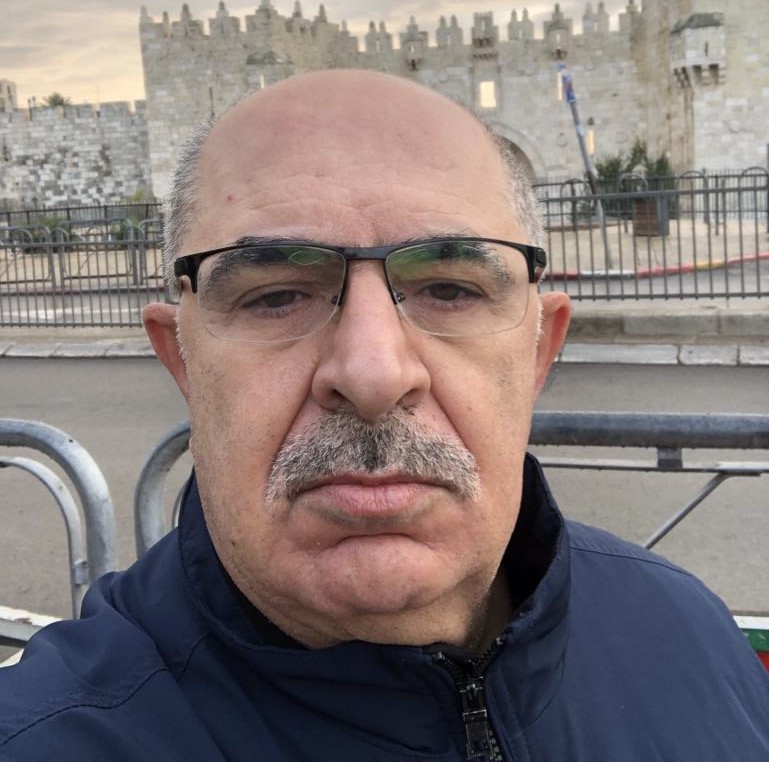News
Baron's Briefing paints gloomy picture of Middle East peace prospects
Wednesday 22 May 2024

Two ex-Reuters veterans, one Palestinian and one Israeli, painted a depressing picture of the prospects for an end to violence in the Middle East at the latest BARON'S BRIEFING, but neither ruled out a faraway peace.
The moderated debate on the Gaza war, held on May 17, was a first for the online briefings, with a discussion between Israeli Arik Bachar (photo right) and Palestinian Sami Aboudi, (photo below) skilfully moderated by former Jerusalem Bureau Chief Paul Holmes.
 They gave deep insights into the feelings and grievances of their societies, agreeing on little except that both sides had lived in constant fear since the creation of the state of Israel in 1948 and had been radicalised by the Gaza conflict. But while the emotions were raw, both observed the best Reuters traditions of a respectful exchange of viewpoints.
They gave deep insights into the feelings and grievances of their societies, agreeing on little except that both sides had lived in constant fear since the creation of the state of Israel in 1948 and had been radicalised by the Gaza conflict. But while the emotions were raw, both observed the best Reuters traditions of a respectful exchange of viewpoints.
Bachar said that people in Western liberal democracies free of war for 80 years could never understand the dread and fear of living in Israel, which had been under existential threat throughout his lifetime “So when we talk about, do people get what it feels like to be an Israeli, I say you cannot at the visceral and the emotional level. You cannot get it because you have not lived it.” |
Aboudi said the origin of the conflict and of the fear on both sides was the occupation of Palestinian territories by Israel. “What we need to start with is the recognition that there is an occupation that is the source of all evil. ”
Bachar and Aboudi disagreed sharply about whether a single state for Palestinians and Israelis was a viable solution.
“Why couldn’t we live in one state?” Aboudi asked, adding that up to 25 percent of Israel’s population was already Palestinian. “How come 25 percent is okay and 50-50 is not okay?”
But Bachar said a one-state solution was not possible before the Oct. 7 Hamas attack that killed 1,200 Israelis, and much less so afterwards. “I mean, even the idea of a two-state solution now for Israelis post Oct. 7 is ridiculous. There has been such a numbing effect of that massacre on Israelis…. the Hamas attack went way beyond the pale and it will take a long time, I think, to take us back to Oct. 6.”
Aboudi agreed that the immediate prospects for a solution were dim. “I don’t belittle the problems that we have now, the mistrust, the hatred, I should say between us. You hate us and we hate you…Hamas killed 1,200. You probably lost 10,000 since 1948. We lost a million since 1948. There’s a lot of blood but it’s mutual blood. “
He said the occupation, the killing of around 200 Palestinians a year by Israeli forces before Oct 7, and the spread of Israeli settlements in the West Bank had stoked enormous frustration and hopelessness among Palestinians,
Despite its major military losses in the war since Oct. 7, Hamas had more support now and was stronger than before. “It demonstrated that you can put up a fight against Israel…and can bring back an issue that was being shelved before Oct. 7. “
Asked about the future, both men were gloomy. “More bloodshed, more fighting for the foreseeable future,” Bachar said. “A two-state solution is the eventual endgame … everybody who has a couple of eyes has to see that. But at the moment it is not on the radar screens.”
Despite the pessimism, both Bachar and Aboudi had slight hopes about a longer-term future. “You know it can happen. It’s just a question of when. But five years is maybe a tad too optimistic,” Bachar said.
Aboudi said the bloodier the conflict, the more difficult peace would become over the next five to 10 years. You need the United States and the world to “shove down the throats of both sides a solution that everybody knows the parameters of”. But whoever won the November U.S. election, neither Joe Biden nor Donald Trump were likely to do this.
The two men did agree on the damage done by Israeli settlements in the West Bank – Bachar called the settlers “disgusting” -- and on the need to remove Israeli Prime Minister Benjamin Netanyahu and his right-wing government. This could possibly open the way to more moderate leaders on both sides who would eventually get back to the peace table, but that was a long way off.
Bachar said the removal of Netanyahu was not a foregone conclusion because of the radicalisation in Israel caused by the Hamas attack. But, “He certainly has to go if we want to change the way things are moving forward, because with him, we are stuck.” ■
- « Previous
- Next »
- 38 of 2176